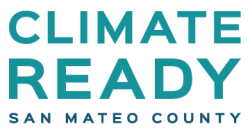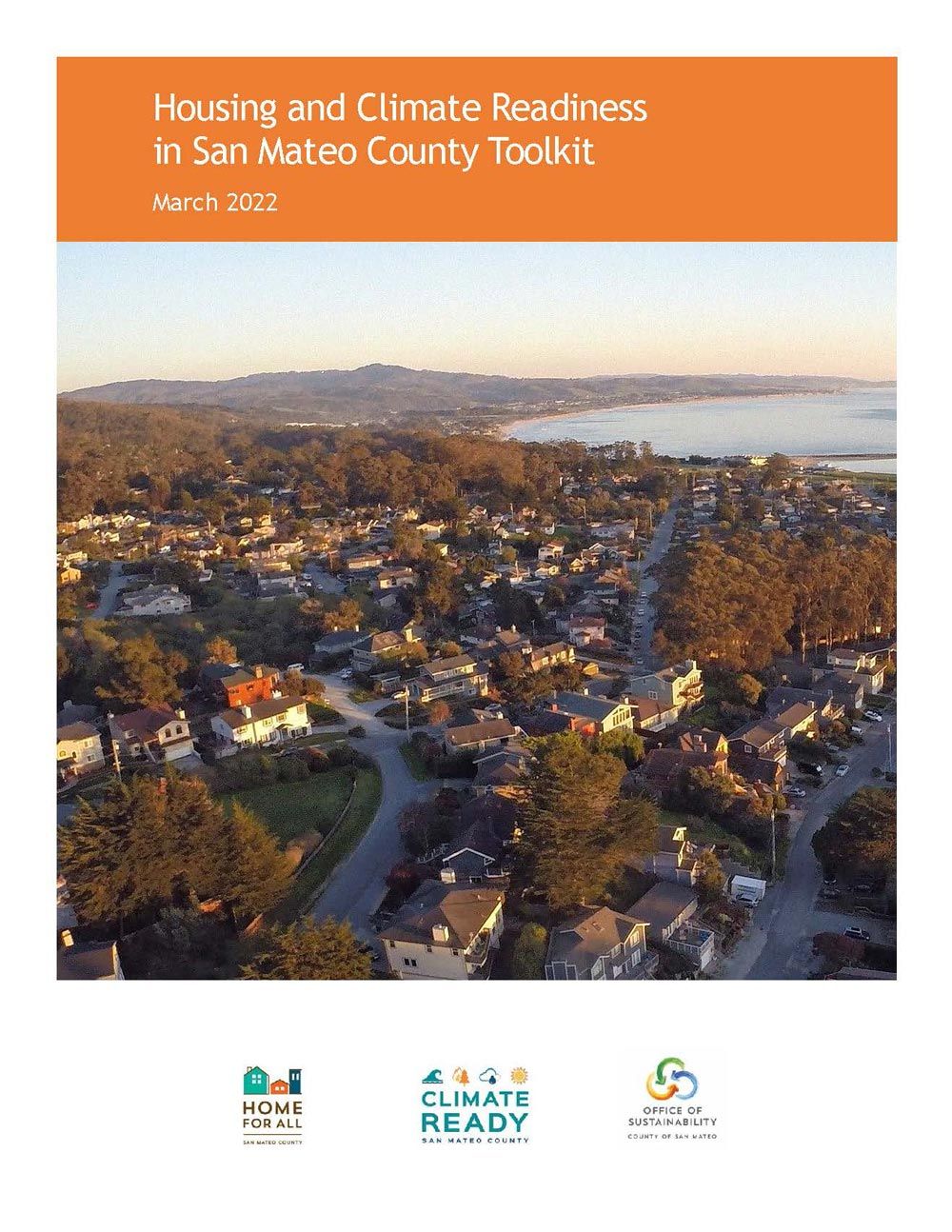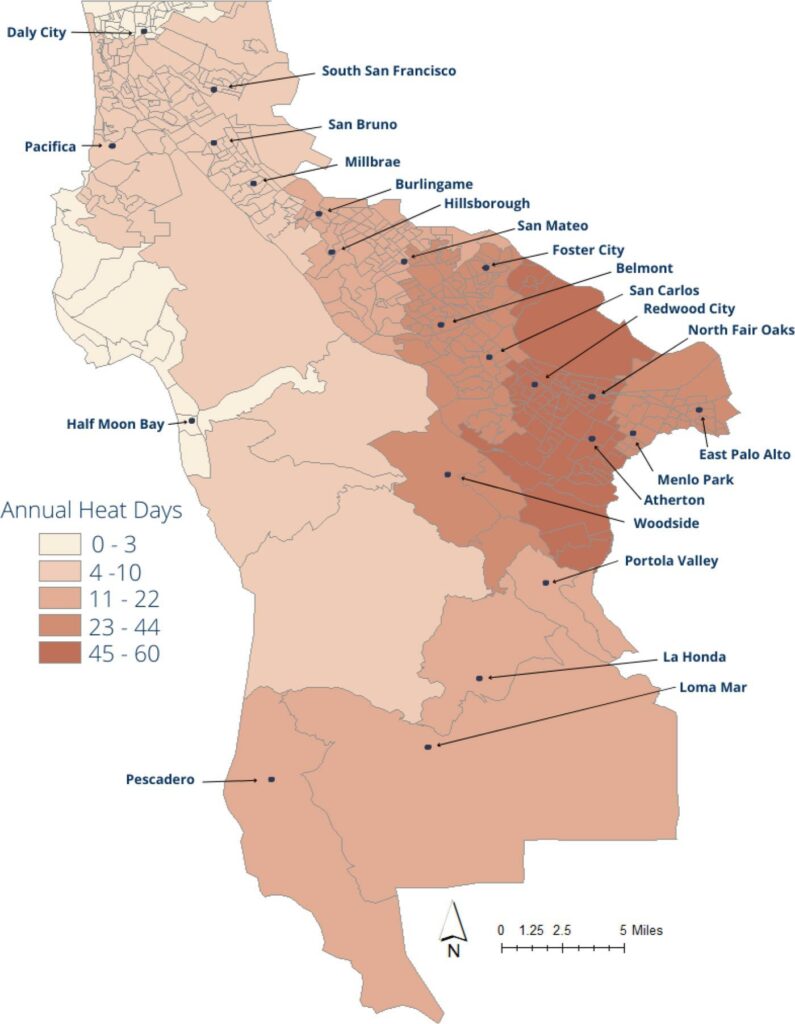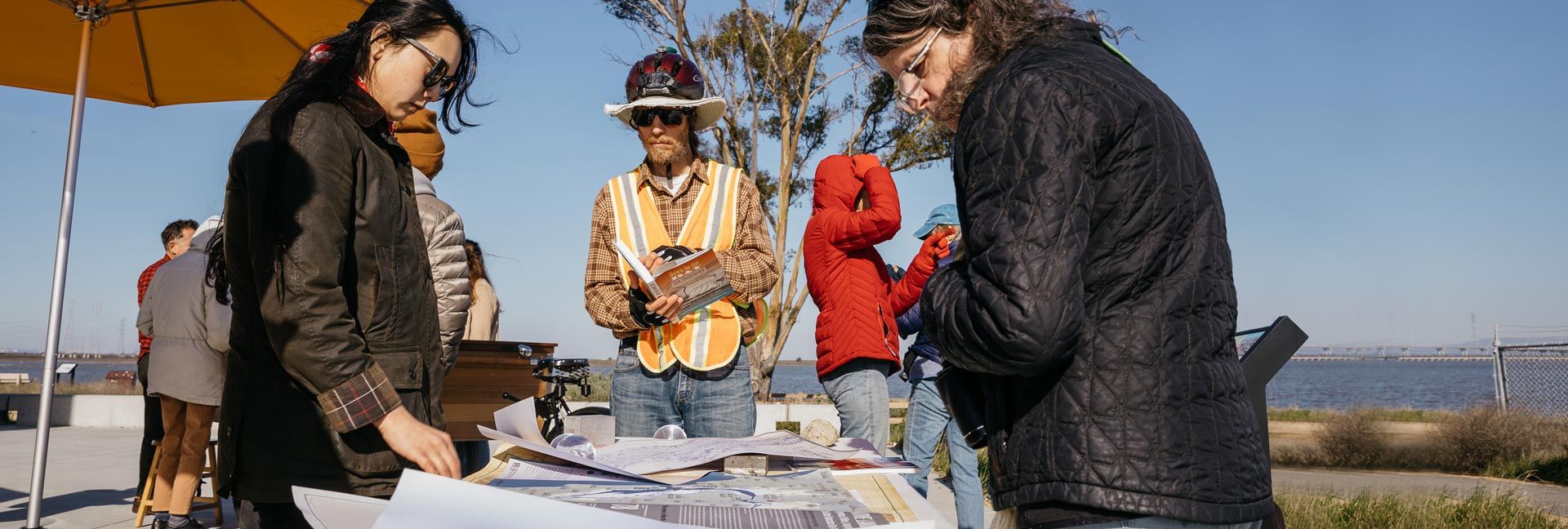
A Climate Ready County
Building leadership and collaboration for inclusive climate solutions.
San Mateo County faces sea level rise, rising temperatures and heatwaves, wildfires and wildfire smoke, flooding, and landslides due to climate change. While the changing climate poses many risks to the people and places in San Mateo County, together we can take steps to adapt and protect our people and our valuable resources.
Featured Initiatives
Senior Coastsiders’ Resiliency Hub
Senior Coastsiders is now open as a Community Resilience Hub in Half Moon Bay during their regular business hours. Outfitted with air coolers and purifiers, misting fans, back up batteries, indoor and outdoor air quality monitors, and thermal window coverings for temperature control, their facility serves as a cooling center, charging station, and clean air haven during extreme heat, power outages and poor air quality.

Housing and Climate Readiness
The Housing and Climate Readiness Toolkit (PDF) identifies best practices in site design and land use for decision-makers and practitioners. To address San Mateo County’s housing shortage and prepare homes for climate change impacts, practitioners will need to pursue bold actions and closer coordination. This toolkit’s strategies provide examples of options that can be used to tackle these complex challenges and case studies where these strategies have been implemented.
Climate Ready SMC Initiative and Collaborative
The Climate Ready SMC Initiative was led by the County of San Mateo Sustainability Department to help communities understand climate impacts now and in the future. In 2019, Climate Ready SMC launched a study to understand how climate change impacts could affect transportation systems and vulnerable communities in the county. Funded by Caltrans and led by the County of San Mateo Sustainability Department, the study evaluated extreme heat, wildfire, and sea level rise impacts. The project led to the creation of a countywide Climate Ready SMC Collaborative which brought together leaders from across sectors, jurisdictions, and communities to foster collaboration and identify potential solutions to make San Mateo County more resilient to climate impacts.
The initiative used a variety of strategies to understand and plan for climate risks including fostering collaboration through webinars and convenings, development of policy tools, modeling climate impacts, creating outreach materials, investing in culturally competent community engagement, and providing technical assistance, partnership, and resources to resiliency projects. Funded in part by Caltrans, Climate Ready SMC provided competitive grant funds and in-kind support for two pilot city-scale adaptation planning projects.
Acterra (Climate Resilient Communities) collaborated with community-based organizations to build the capacity of East Palo Alto community leaders and residents in sea-level rise vulnerability planning, adaptation strategy development, and resilience implementation.
City of Half Moon Bay collaborated with community-based organizations to increase involvement from typically underrepresented populations in their Climate Action and Adaptation Planning process.
Past Climate Ready Convenings and Webinars
San Mateo County hosted six convenings and two webinars focused on key climate risks and potential solutions. Learn more about local risks and city and community-led solutions for wildfire, sea level rise and flooding, extreme heat and intersections with health, economic, and social resiliency by exploring the convening videos and materials.
The Climate Ready SMC Collaborative launch occurred on January 30, 2019. A large and diverse group attended including: Staff and council members from fifteen of twenty cities in San Mateo County, representatives from the North Fair Oaks and Midcoast Community Councils and Pescadero Municipal Advisory Committee, nearly twenty special districts, local and regional agencies, and fifty-five organizations from the non-profit/community-based organization, business, and academic sectors were in attendance.
The Preparing for Wildfire Convening of the Climate Ready SMC Collaborative occurred on March 13, 2019. The working session following the presentations addressed the following areas: evacuation planning, public safety communications, vegetation management, community preparedness and safety net services.
The Moving from Vision to Action Convening occurred on April 30, 2019. The Collaborative discussed the Collaborative First Year Action Plan and the Community Adaptation Planning Pilots project opportunities. Members of the Collaborative also presented on their climate readiness and adaptation efforts.
The Turning the Tide: Connecting for Community Resiliency Convening occurred on June 5, 2019. Presenters addressed combined storms, flooding, and sea level rise risks modeling results and showcased successful projects and best practices for action on sea level rise and flooding preparedness.
The Turning Up the Heat on Community Resiliency Convening occurred on July 31, 2019. The goal of the convening was to bring together stakeholders with a shared interest in rising temperatures and extreme heat risks and preparedness.
The keynote speaker, Molly Peterson, presented a reporter’s perspective on urban heat and health risk, emerging challenges, and potential solutions for communities to explore. Other speakers presented on modeling results of rising temperatures, extreme heat and transportation impacts in San Mateo County and risks to outdoor and agriculture workers and medically vulnerable residents. Alameda County and Contra Costa Counties presented on their heat resilience implementation programs. Attendees then discussed strategies and resource needs to build resilience to heat impacts in San Mateo County.
The Building Health, Economic, and Social Resiliency to Climate Change occurred on September 25, 2019. The goal of the convening was to bring together stakeholders to share the intersection between, and build capacity for, addressing climate change, health, and social vulnerability.
The keynote speaker, Srija Srinivasan, Deputy Chief of San Mateo County Health, presented on root causes of health and health inequity, prevalence of chronic conditions, and varying physical and emotional effects experienced by San Mateo County residents.
Other speakers presented on how economic, social and health conditions could impact the ability of residents, workers, infrastructure, and businesses to adapt to climate change impacts. Modelling overlay results of social vulnerability indicators over newly developed extreme heat, flooding, and wildfire climate scenarios in San Mateo County were also shared with the attendees. Greenlining Institute, Youth United for Community Action, and the California Department of Public Health Office of Health Equity, presented on emerging challenges and potential solutions to explore. Attendees then discussed strategies and resource needs to build health and social resilience in San Mateo County.
CLIMATE DATA FOR SAN MATEO COUNTY

Click on links below to view maps and download data:
- Extreme Heat
- Groundwater Rise
- Sea Level Rise
- Wildfire Projections
-
SMC Hazard Risk Data (2021 Local Hazard Mitigation Plan)
Other relevant databases:
- Drought Monitor
- Flood Zones (FEMA)
- MTC/ABAG Hazard Viewer Map (Landslides, Historic Wildfire Perimeters, Earthquake)
- OneShoreline’s Flood Early Warning System
- Urban Heat Islands
- Wildfire Zones (CALFIRE)
- SMC Social Vulnerability







